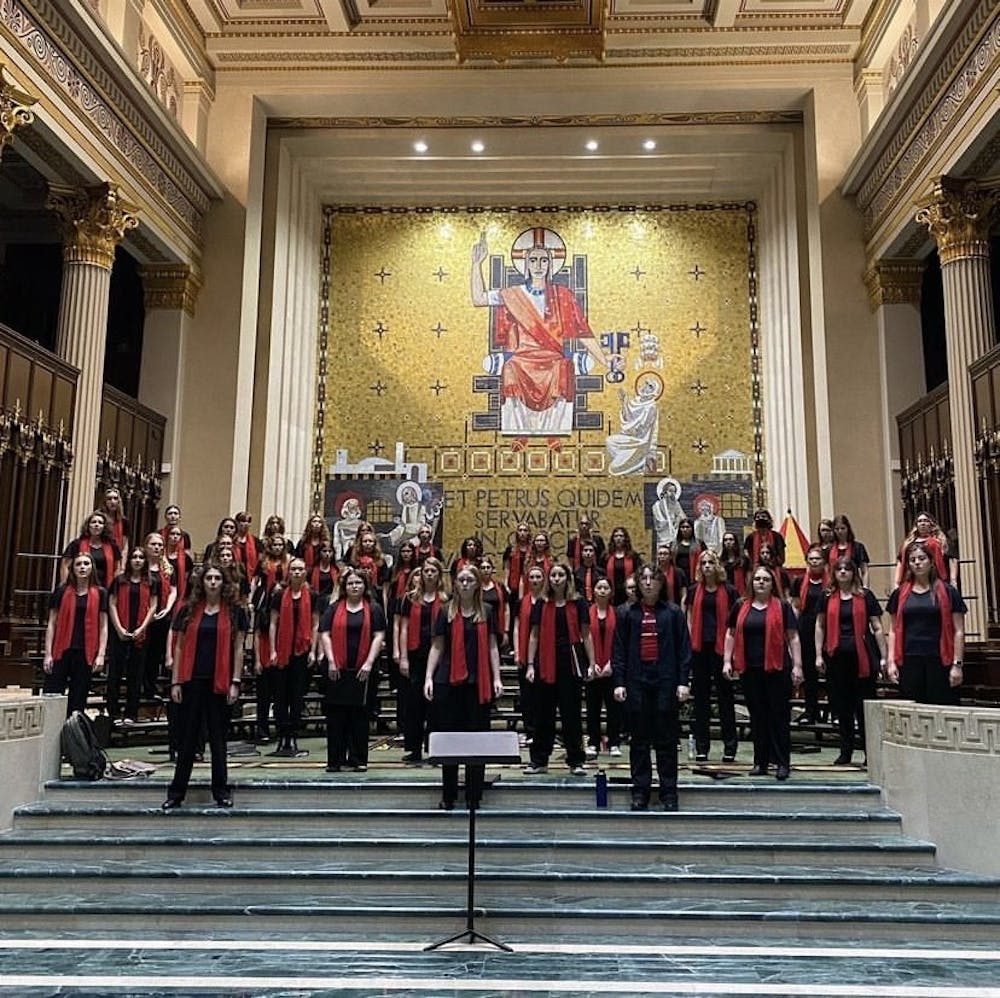During his time at Miami University, Nico Hollander has found himself learning Latin, Swahili and Korean.
The fourth-year political science major didn’t seek out the languages in his academic schedule, though. Each language came to him in song through the Men’s Glee Club.
“Directors generally always do incorporate music from different cultures,” Hollander said. “International music is very universal.”
Hollander and his peers may not be fluent in the languages they sing in, but an international repertoire plays an important role in connecting musicians at Miami to different cultural experiences from around the world.
“It's a form of human expression,” Hollander said. “And I think that we are all trying to express our universal feelings — be it love, happiness, sadness, mourning, whatever it is — I think that's what makes it universal. It's the feelings and the passions that come out of it.”
Jeremy Jones directs the Men’s Glee Club and Miami’s Chamber Singers. When choosing a repertoire, his goal is to help both the singers and the audience connect with the message of the music and relate it to their own experiences, even if on the surface they don’t seem to relate.
In two weeks, the Glee Club is performing a program titled “We Are United” for the Intercollegiate Men’s Choruses National Seminar. Jones said the program is about people from diverse backgrounds uniting to improve the human condition.
It’s a theme well-suited to be shared through music.
“When you couple text and music together, it really just adds sort of gravitas,” Jones said. “It adds emotional connection to the narrative programming … and to what we’re trying to communicate.”
Before any ensemble can put on a concert, each member needs to understand the meaning and context of the pieces they perform. Robyn Lana, a visiting faculty member and director of Miami’s treble choir, the Miami Choraliers, said the group’s repertoire is an opportunity for education, not just to perform.
“A big thing in choral music and the arts in general … right now is making sure you’re recognizing and celebrating the culture and the things that are special from people that are outside of your immediate culture,” Lana said, “exposing the world to the world beyond.”
Last semester, the Choraliers performed “Hold On,” a spiritual written by Stacey Gibbs. Spirituals are religious folk songs with roots in the African American community during the 1800s and are tied to America’s history with the enslavement of Black people. Gibbs, a Black composer, uses phonetic spelling to accentuate the pronunciation of the lyrics, with the first phrase of the song reading “Keep yo’ han’ on de plow an’ hold on.”
Enjoy what you're reading?
Signup for our newsletter
“There’s always an authentic nod to the history, the pronunciation of words,” Lana said. “[But] if you don’t know he’s an African American composer, you might have singers think you’re doing some cultural appropriation.”
Catherine Madden, a senior music composition major and Choralier, said the group learned about the history of spirituals and the genre’s ties to slavery before learning the piece. Still, only 3.6% of the Oxford campus is Black, and Madden said they had conversations about feeling uncomfortable using African American Vernacular English to perform.
“Sometimes as white people we feel not comfortable reading those out the way that they’re written out, but that’s the way that the composer wants us to perform their piece,” Madden said. “We have a duty as performers to do justice to what the composer wanted.”
Lana said she works to quickly earn the trust of each ensemble she works with so they understand that every piece is being performed respectfully. Miami’s music department also regularly invites guests to speak about their work and provide opportunities for students to learn about music from different cultures.
Last semester, Jones invited Rollo Dilworth, a Black composer and professor at Temple University, to visit Oxford. Some of Miami’s vocal groups performed Dilworth’s spiritual “Great Gettin’ Up Mornin’” together in the fall.
“It’s really great to make sure that what we’re doing is authentic … and so to have him on campus speaking with our students and learning from him about the African American tradition of gospels and spirituals was impactful and meaningful,” Jones said.
For Madden, the music itself is a way to learn, even without meeting every composer.
“Music is really one of the first ways that people engage with other cultures,” Madden said. “Some people will hear music before even meeting someone who belongs to that culture … especially because every culture has music.”




